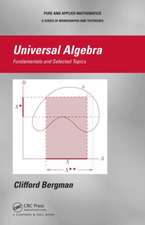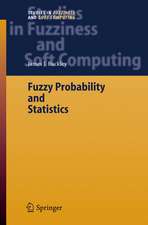An Introduction to Fuzzy Logic and Fuzzy Sets: Advances in Intelligent and Soft Computing, cartea 13
Autor James J. Buckley, Esfandiar Eslamien Limba Engleză Paperback – 11 ian 2002
Din seria Advances in Intelligent and Soft Computing
- 18%
 Preț: 2813.03 lei
Preț: 2813.03 lei - 20%
 Preț: 1273.74 lei
Preț: 1273.74 lei - 18%
 Preț: 1214.72 lei
Preț: 1214.72 lei - 18%
 Preț: 1221.07 lei
Preț: 1221.07 lei - 20%
 Preț: 653.06 lei
Preț: 653.06 lei - 20%
 Preț: 1919.02 lei
Preț: 1919.02 lei - 20%
 Preț: 984.04 lei
Preț: 984.04 lei - 20%
 Preț: 1746.05 lei
Preț: 1746.05 lei - 20%
 Preț: 1906.99 lei
Preț: 1906.99 lei - 20%
 Preț: 1763.71 lei
Preț: 1763.71 lei - 20%
 Preț: 1278.68 lei
Preț: 1278.68 lei - 20%
 Preț: 1926.61 lei
Preț: 1926.61 lei - 20%
 Preț: 3183.20 lei
Preț: 3183.20 lei - 20%
 Preț: 334.86 lei
Preț: 334.86 lei - 20%
 Preț: 1916.55 lei
Preț: 1916.55 lei - 20%
 Preț: 981.25 lei
Preț: 981.25 lei - 20%
 Preț: 1934.70 lei
Preț: 1934.70 lei - 20%
 Preț: 1932.07 lei
Preț: 1932.07 lei - 20%
 Preț: 979.71 lei
Preț: 979.71 lei - 20%
 Preț: 1920.84 lei
Preț: 1920.84 lei - 15%
 Preț: 647.92 lei
Preț: 647.92 lei - 20%
 Preț: 985.86 lei
Preț: 985.86 lei - 20%
 Preț: 641.16 lei
Preț: 641.16 lei - 20%
 Preț: 3174.14 lei
Preț: 3174.14 lei - 20%
 Preț: 1293.71 lei
Preț: 1293.71 lei - 20%
 Preț: 2890.01 lei
Preț: 2890.01 lei - 20%
 Preț: 1924.15 lei
Preț: 1924.15 lei - 20%
 Preț: 1901.71 lei
Preț: 1901.71 lei - 20%
 Preț: 1934.70 lei
Preț: 1934.70 lei - 20%
 Preț: 1918.04 lei
Preț: 1918.04 lei - 20%
 Preț: 1919.02 lei
Preț: 1919.02 lei - 20%
 Preț: 1310.68 lei
Preț: 1310.68 lei - 20%
 Preț: 1931.42 lei
Preț: 1931.42 lei - 20%
 Preț: 1941.96 lei
Preț: 1941.96 lei - 20%
 Preț: 2217.66 lei
Preț: 2217.66 lei - 20%
 Preț: 1297.17 lei
Preț: 1297.17 lei - 20%
 Preț: 1295.71 lei
Preț: 1295.71 lei - 20%
 Preț: 1306.07 lei
Preț: 1306.07 lei - 20%
 Preț: 1277.06 lei
Preț: 1277.06 lei - 20%
 Preț: 1909.64 lei
Preț: 1909.64 lei - 20%
 Preț: 668.07 lei
Preț: 668.07 lei
Preț: 419.25 lei
Preț vechi: 524.07 lei
-20% Nou
Puncte Express: 629
Preț estimativ în valută:
80.22€ • 83.93$ • 66.64£
80.22€ • 83.93$ • 66.64£
Carte tipărită la comandă
Livrare economică 03-17 aprilie
Preluare comenzi: 021 569.72.76
Specificații
ISBN-13: 9783790814477
ISBN-10: 3790814474
Pagini: 296
Ilustrații: X, 285 p.
Dimensiuni: 155 x 235 x 16 mm
Greutate: 0.46 kg
Ediția:2002
Editura: Physica-Verlag HD
Colecția Physica
Seria Advances in Intelligent and Soft Computing
Locul publicării:Heidelberg, Germany
ISBN-10: 3790814474
Pagini: 296
Ilustrații: X, 285 p.
Dimensiuni: 155 x 235 x 16 mm
Greutate: 0.46 kg
Ediția:2002
Editura: Physica-Verlag HD
Colecția Physica
Seria Advances in Intelligent and Soft Computing
Locul publicării:Heidelberg, Germany
Public țintă
GraduateCuprins
1 Introduction.- 2 Logic.- 3 Fuzzy Sets.- 4 Fuzzy Numbers.- 5 Fuzzy Equations.- 6 Fuzzy Inequalities.- 7 Fuzzy Relations.- 8 Fuzzy Functions.- 9 Fuzzy Plane Geometry.- 10 Fuzzy Trigonometry.- 11 Systems of Fuzzy Linear Equations.- 12 Possibility Theory.- 13 Neural Nets.- 14 Approximate Reasoning.- 15 Genetic Algorithms.- 16 Fuzzy Optimization.- List of Figures.- List of Tables.
Recenzii
From the reviews:
"A well written book which enables to the reader fundamental orientation in the fuzzy logic. From the educational point of view the book is very well organized. … Majority of chapters begin with several motivation examples and at the end of each chapter there are a lot of solved and unsolved examples. … dedicated to undergraduate students as a textbook. … it may be suitable for readers from the application sphere who are not professionals in fuzzy logic but utilize some fuzzy methods … ." (Petr Vysoky, Neural Network World, Vol. 13 (4), 2003)
"The book is an undergraduate textbook covering as an impressively broad range of topics … . The book is well-written … each of the chapters providing basic definitions, examples, and exercises. … The book is intended as an introductory textbook on the theory of fuzzy sets, functioning as the basis for a curriculum in fuzzy systems. … I would recommend the book to the reader who wants to get an introductory overview of how much of mathematics can be fuzzified." (Marc Pauly, Expert Update, Vol. 5 (2), 2002)
"This book is an undergraduate introduction to the theory of fuzzy sets, giving basic information for beginners. … Each chapter ends with a set of relevant problems and exercises. … The book can be recommended as a good textbook for students and beginners in computer science, engineering or economics interested in non-probabilistic uncertainty modeling." (R. Mesiar, Zentralblatt MATH, Vol. 985, 2002)
"A well written book which enables to the reader fundamental orientation in the fuzzy logic. From the educational point of view the book is very well organized. … Majority of chapters begin with several motivation examples and at the end of each chapter there are a lot of solved and unsolved examples. … dedicated to undergraduate students as a textbook. … it may be suitable for readers from the application sphere who are not professionals in fuzzy logic but utilize some fuzzy methods … ." (Petr Vysoky, Neural Network World, Vol. 13 (4), 2003)
"The book is an undergraduate textbook covering as an impressively broad range of topics … . The book is well-written … each of the chapters providing basic definitions, examples, and exercises. … The book is intended as an introductory textbook on the theory of fuzzy sets, functioning as the basis for a curriculum in fuzzy systems. … I would recommend the book to the reader who wants to get an introductory overview of how much of mathematics can be fuzzified." (Marc Pauly, Expert Update, Vol. 5 (2), 2002)
"This book is an undergraduate introduction to the theory of fuzzy sets, giving basic information for beginners. … Each chapter ends with a set of relevant problems and exercises. … The book can be recommended as a good textbook for students and beginners in computer science, engineering or economics interested in non-probabilistic uncertainty modeling." (R. Mesiar, Zentralblatt MATH, Vol. 985, 2002)
Textul de pe ultima copertă
This book is to be the starting point for any curriculum in fuzzy systems in fields like computer science, mathematics, business/economics and engineering. It covers the basics leading to: fuzzy clustering, fuzzy pattern recognition, fuzzy database, fuzzy image processing, soft computing, fuzzy applications in operations research, fuzzy decision making, fuzzy rule based systems, fuzzy systems modeling, fuzzy mathematics. It is not a book designed for researchers - it is where you really learn the "basics" needed for any of the above-mentioned applications.
Caracteristici
Basic text book with short sections, many figures, problem sets at the end of sections Includes supplementary material: sn.pub/extras




















